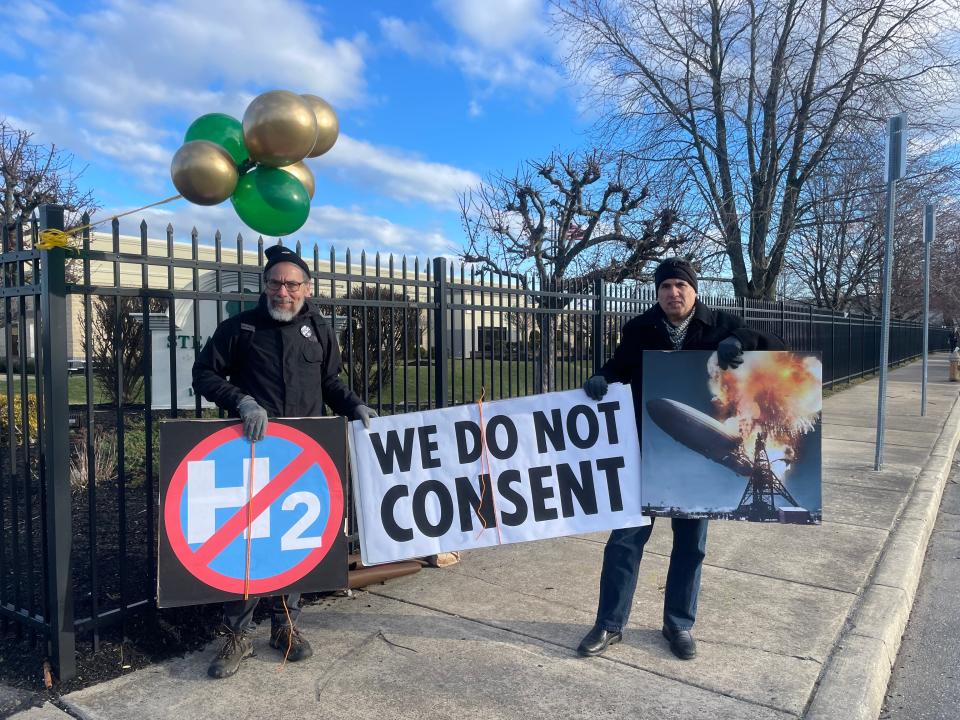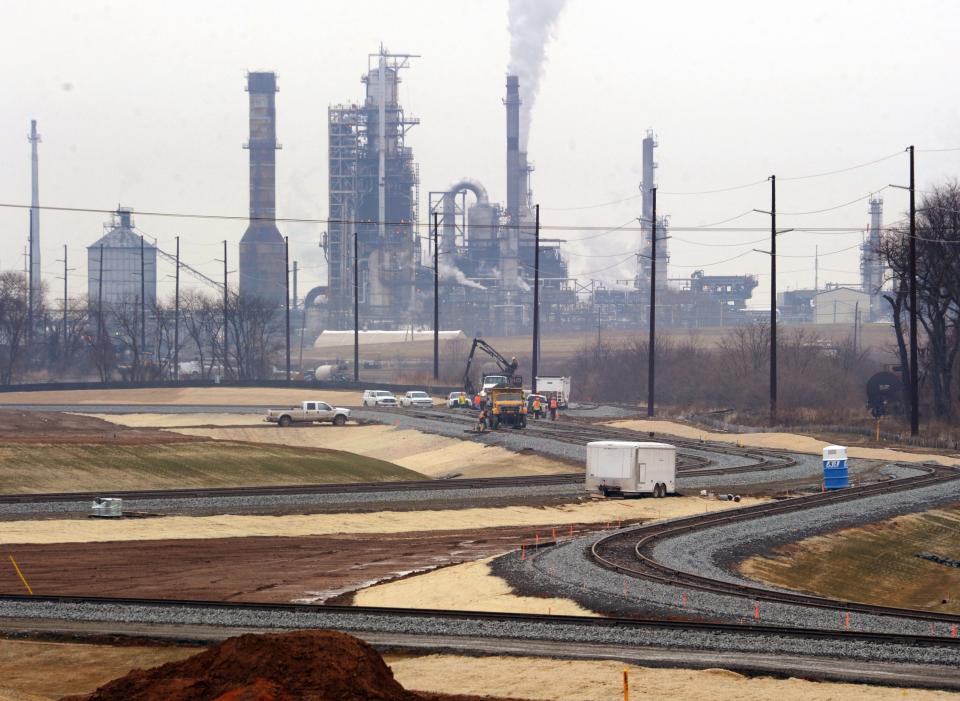What to know about Delaware's hydrogen-powered future
Things are moving along with Delaware’s future as a hydrogen producer for the Mid-Atlantic region, to the dismay of community members and environmental advocates.
Concrete details are still unconfirmed, but the future of the hydrogen economy is beginning to take shape and the state of Delaware is set to be a big part.
A meeting was held in mid-March regarding the Mid Atlantic Hydrogen Hub (MACH2), which was announced as an official recipient of federal funding in October. The public meeting was largely attended by representatives from the energy industry and elected officials, sparking a debate about just how and when community members should be involved.
What is MACH2?
President Joe Biden came to Philadelphia in October to announce that around $8 billion in federal money would be handed out to seven regional hubs to establish hydrogen "hubs" around the nation.
Among those recipients is the MACH2 project, set to be funded with up to $750 million of federal money to create a “hydrogen economy” spanning southeastern Pennsylvania, New Jersey and Delaware.
Background: Delaware to become the next hub for hydrogen power. Here's what to know
There are multiple ways to make hydrogen power, not all of which are considered the most environmentally friendly. Around 1% of U.S energy production is made up of "gray" hydrogen, which is powered with natural gas and emits methane, a potent greenhouse gas.
MACH2 organizers want the Mid-Atlantic to become the only completely emission-free hub in the country, using renewable and nuclear energy sources to power the hydrogen plants. The hydrogen power can then be used to power industries that are trickier to electrify like the transportation or heavy industrial sectors. Project labor agreements will be used to create around 20,800 union jobs — 14,400 in construction and 6,400 permanent positions — across all three states.
The plan is to use existing pipeline infrastructure (more on this later), and essentially revamp power plants to make them hydrogen-ready, powered by renewable energy sources like wind or solar. However, the exact renewable sources are still up in the air.
The $750 million is expected to be disbursed in five phases between this year and 2032.
A public meeting met with backlash
A meeting was held Monday, March 11, at the Philadelphia Steamfitters Union Hall to present the group's vision for revolutionizing the Mid-Atlantic's energy production. Most attendees of the near-five-hour event were affiliated with the energy industry or municipalities.
Among the speakers were Jim Snell with the Steamfitters Union; MACH2 co-chair and Delaware gubernatorial candidate Collin O'Mara; and elected officials Gov. Josh Shapiro, D-Pa.; Sen. Bob Casey, D-Pa.; and Rep. Mary Gay Scanlon, D-Pa.
Two panels were held with experts to discuss community outreach and benefits packages that would need to be addressed, as well as an operational panel speaking to the industry side of the hub. Maurizio Costante from PBF Refining Co., the owner of the Delaware City Refinery, was among the speakers at the latter panel.

Despite being outnumbered, community groups showed up by the dozens to the meeting to protest the progression of the MACH2 hydrogen hub, many wearing "Stop MACH2" stickers and holding posters opposing the project. During Pennsylvania Gov. Josh Shapiro’s speech, Delaware Riverkeeper Maya van Rossum stood and yelled protests regarding the lack of transparency and community outreach.
"The Department of Energy said that community engagement is supposed to be the highest priority," van Rossum exclaimed over the speech. "You have yet to have a meeting with the impacted community members to hear what they have to say. When are you going to have a meeting with those community members?"
Shapiro's attempts at continuing his original speech ultimately proved fruitless and the frustration among the attendees, who were largely in support of the hub, turned explosive as expletives were shouted back at the protesters.
"The MACH2 Hydrogen Hub is going to have profound, far-reaching and perpetual impacts on frontline communities and on our region," van Rossum said after the meeting. "The workday timing, the location and the failure to ensure community members have a meaningful way to express concerns, input and questions throughout the meeting demonstrates an abject disregard for communities and ensuring environmental justice ...."
Delaware's role in hydrogen's future
MACH2 is meant to reduce the impact of some of the highest emitters in the region, especially centralized in the Philadelphia, Camden (New Jersey) and Wilmington urban centers.
Included in the preliminary draft concept were a handful of Delaware plants and businesses that could be repurposed for the MACH2 plans such as DuPont/Croda plant near New Castle, the Delaware City Refinery, hydrogen tech start-up sHYp in Wilmington. Nearby Chesapeake Solar in Maryland also was mentioned as being a potential source for renewable energy.
PBF’s Delaware City Refinery will be used for hydrogen production in the MACH2 plans. PBF previously sold its hydrogen plants to by Air Products and Chemicals in 2020.

During the public meeting, Maurizio Costante from PBF Refining Co., the owner of the Delaware City Refinery, stated that the refinery plans on capitalizing on both the production and distribution sides of the hydrogen business.
Costante said that setting up electrolyzers, which create hydrogen power from water, on the refinery’s property is the likely route that would be taken. A truck fueling facility is also planned on the site to distribute the hydrogen by truck to local markets.
“We anticipate [DART] to use hydrogen,” Costante said. “In addition to that, in the southern part of the state, there’s a lot of agricultural products that are using long-haul trucks to markets. We anticipate over time that the fuel source of those will be transitioned from diesel to hydrogen as well.”
He also estimated that with the abundance of logistics centers in Delaware, Amazon could use the hydrogen to power their pit crews.
More: Creative library project underway in Wilmington to spur community and economic development
Dover hops on the hydrogen bandwagon
Delaware approved $1.7 million in grants toward a new 57,000-square-foot green energy plant at 60 Starlifter Ave. next to the Dover Air Force Base.
Green energy company FFI Ionix Inc. presented plans to expand its production of hydrogen in Delaware during a Development Finance Committee meeting in February. It’s currently based in a 15,000-square-foot space in Harrington. The company plans to invest $12 million into the plant and include 22,000 square feet of lab space to more than double its workforce, potentially adding 25 new jobs.
Ionix received 10 patents last year for membrane electrolysis equipment, which is a process in which water is split into hydrogen and oxygen ions.
This is the process MACH2 wants to focus on in their hydrogen hub, claiming that if they use renewable energy like solar or wind to create hydrogen, they won't produce harmful methane or carbon dioxide emissions. Environmental groups who have expressed hesitancy about hydrogen’s viability have claimed that this process takes too much water and too much energy, no matter the source.
Environmentalists express concern
One of the biggest objections from groups like the Delaware Riverkeeper Network is that there is limited specific public information available regarding the exact project plans such as where the plants will be set up, a timeline on funding and construction processes, and potential environmental and community impacts.
At the end of January, a joint letter was submitted to the MACH2 Hub, the U.S. Department of Energy and the Office of Clean Energy Demonstrations by 45 organizations and 184 individuals expressing concerns about the reliance on hydrogen power. The complaints paint hydrogen as a "false solution" to the climate crisis due to the amount of water and energy it takes to make.
“Community access and engagement should not be simply political rhetoric but that is exactly what is happening when it comes to MACH2,” said Delaware Riverkeeper Maya van Rossum. “… The only people who have had a say in the projects are industry, academic institutions and others who are already receiving or are set to receive big money payouts from the project.”
The potential use of old pipelines and power plants is also troublesome to community and environmental activists, who call the move potentially "devastating" to Delaware's marine life, ecosystems and environmental justice communities.
After the public meeting was announced in mid-February, another letter was submitted to the MACH2 organizers, the U.S Department of Energy and the White House Environmental Justice Advisory Council by 32 organizations claiming that the meeting, which was held outside of Philadelphia from around 8 a.m. until after noon, was not an inclusive enough meeting time or place for impacted communities.
Nuclear energy set to be used while renewable sources are getting set up are projected to come from New Jersey's Salem Nuclear Generating Station, which has been in litigation with the Delaware Riverkeeper Network over claims that the plant’s discharge into the Delaware River has resulted in billions of fish kills every year.
The Department of Energy's Office of Clean Energy Demonstrations will host a public listening session online on Wednesday, April 10, at 6 p.m. Attendees can choose to speak directly to a member of the office for up to four minutes or just listen in. Registration for the webinar can be completed by visiting this website: energy.gov/oced/h2hubs-local-engagement-opportunities
O'Mara and other officials affiliated with the project have ensured that more community meetings are in the works, but no details have been confirmed as of yet.
Molly McVety covers community and environmental issues around Delaware. Contact her at mmcvety@delawareonline.com. Follow her on Twitter @mollymcvety.
This article originally appeared on Delaware News Journal: Delaware's hydrogen hub progresses despite backlash

